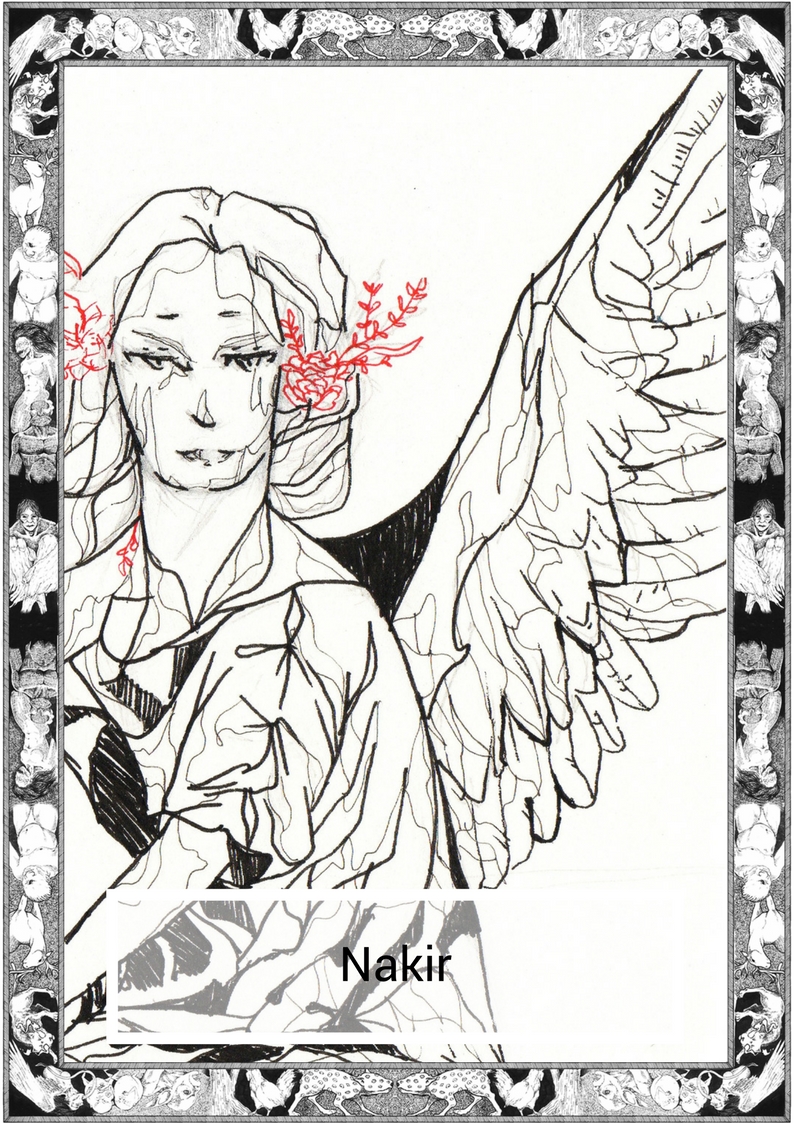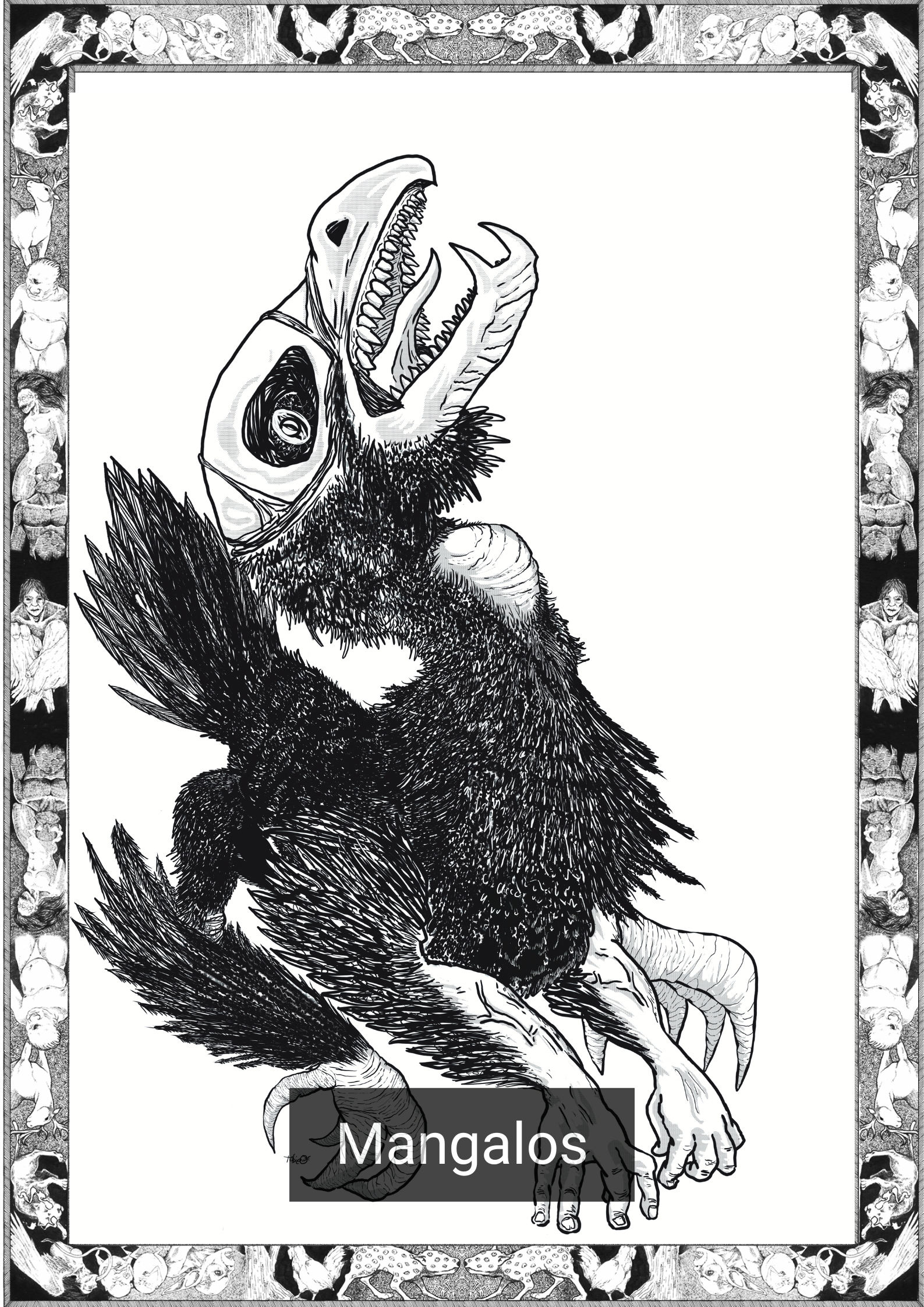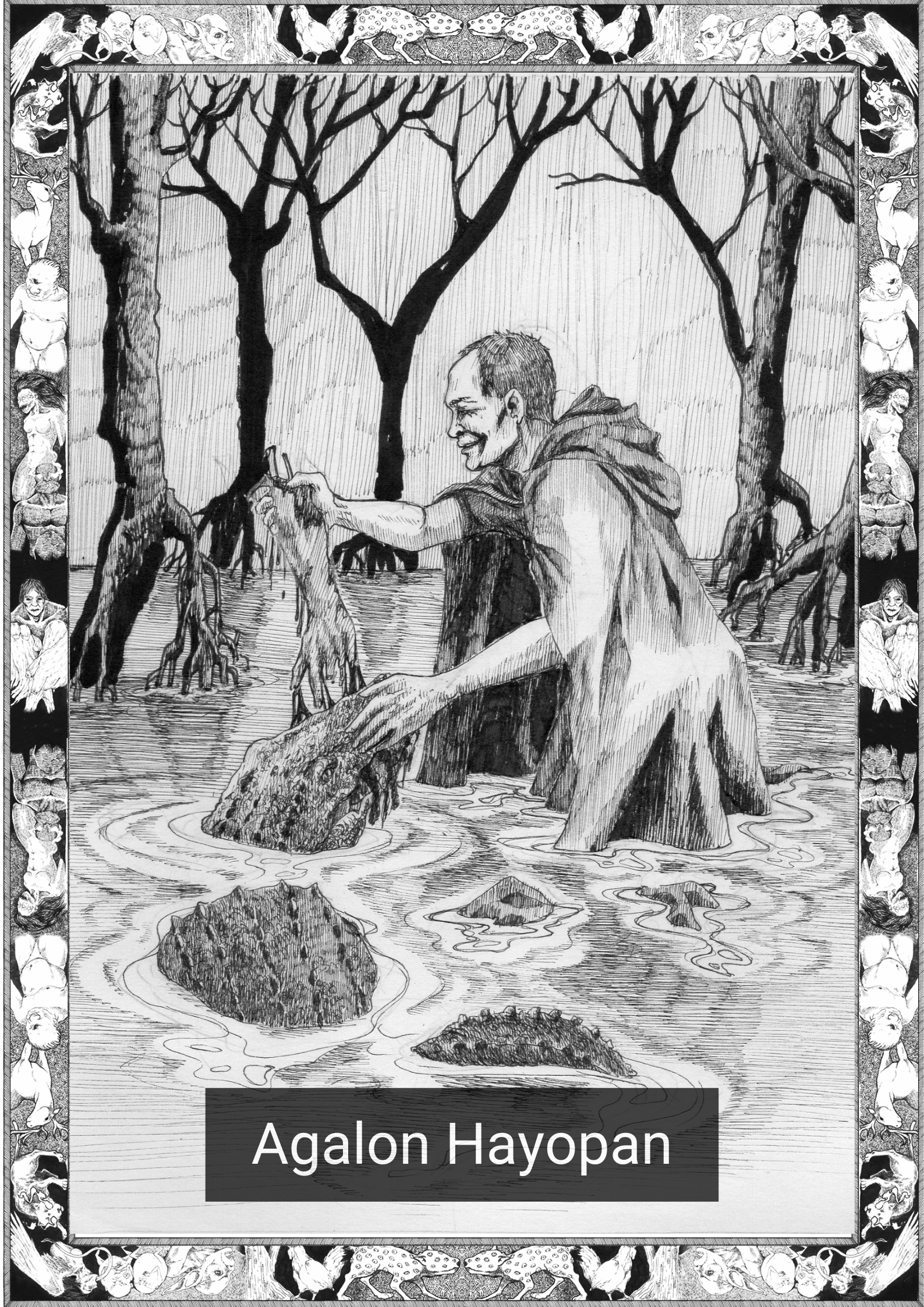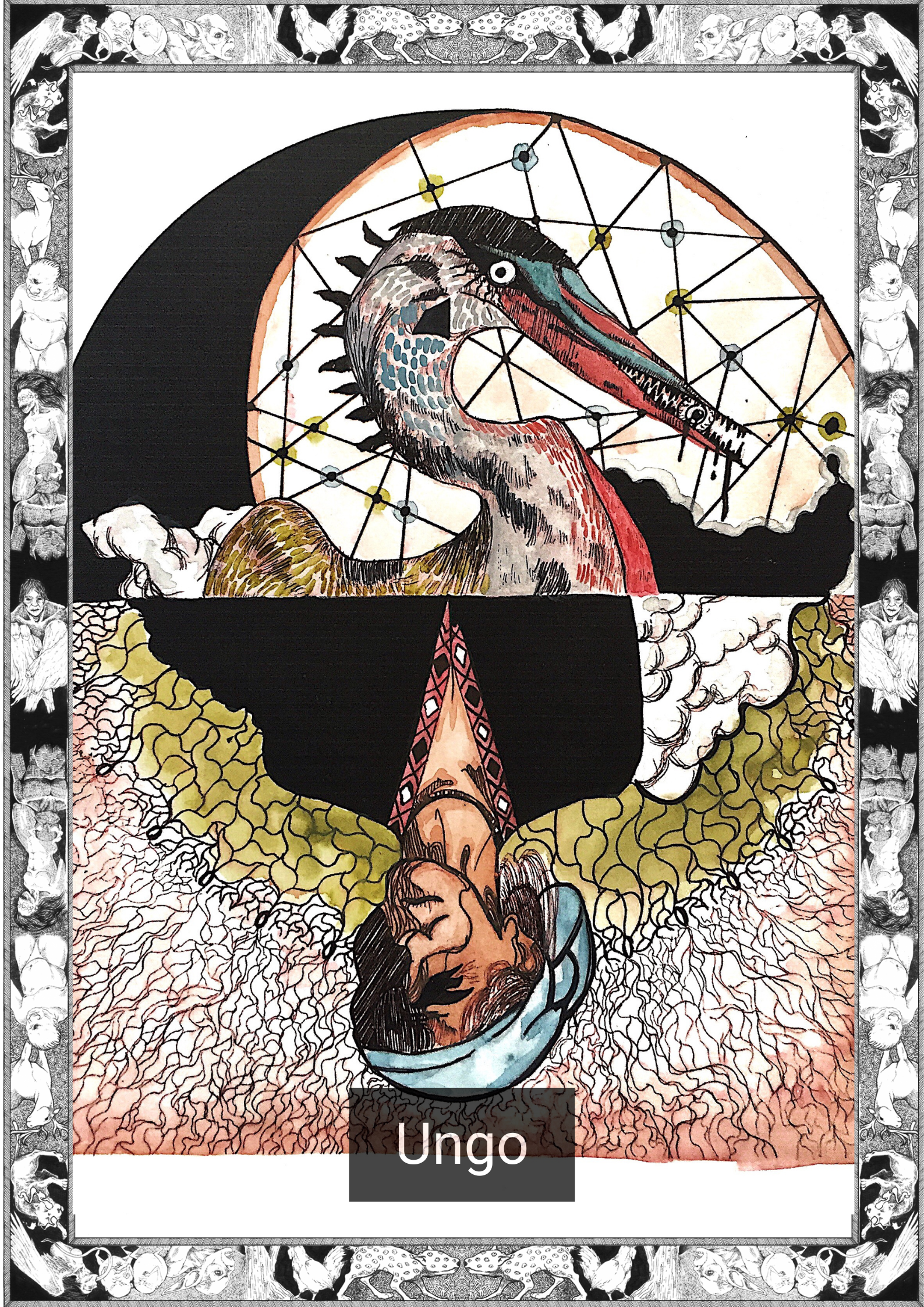
*Note this story is in Bicol-Naga
Pigpugolan ning higot ni Fatima an saiyang hijab. Madali nang magpuon an saiyang paghahalat. Aram niya na maaanggotan siya kan saiyang ina kun dae siya mapundo kan saiyang pag paghaha’dit kaya pigpurbaran niya na mag-isip nin ibang mga bagay na makakapagpakalma sa saiya.
Nagkakapirang oras pa lang kan magadan si Munabi asin pigpupu’nan nang ipreparar an saiyang hawak para sa ritwal. Magaya-gaya an saiyang pagkagadan. Nasa kahaloyan na an saiyang paghehelang asin an kinaherakan man siya kan Dios na pigtugotan na siya na maka-awas na sa kina’ban.
Matuninong na pighurop-hurop ni Fatima an limang ritwal na piglalahi para sa nagadan. Nahuhurop niya na kun an ritwal gigibuhon man saiya pag siya naman an nagadan pero pigpugolan niya na mag-isip man nin siring. Pigpapagirumdoman niya an sadiri na hoben pa siya para magpara-isp nin manungod sa kagadanan. Gabos na bagay maabot man sa saindang oras pero nag-aasa siya na sana haloy pa ini na mangyari.
Nagpuon na sinda sa “ligu’un siyam” an siyam na pagkakarigos. Sabi kan Imam na para ini sa paglilinig kan siyam na parteng opisyal kan lawas sa gabos na ati’ asin maka-aati’ na materyales. “Maray na ngani na malinig siyang makaka-abot sa langit.” napangisi na sana’ si Fatima sa siring na paghuhuna. Importante an ritwal para sa saiya kun pa’nong ini importante man sa gabos na mga kahimanwa. Dawa na ngani dae siya komportable sa kaisipan manungod sa kagadanan, may nagkakapirang bagay na naaaprisyar siya sa mga seremonya.
“Ipigmamanda ko na kuanon na nindo an gadan.” sabi kan malagong na boses na hali kun sain asin dawa sain.
“Gigibuhon mi na an pag-iimbestigar siring kan samuyang trabaho.” May mga pakpak na naghurunat na nagpapasiring sa daeng katapusan.
Duwang bagay an nag-iirinutan na garong bulalakaw hali sa kalangitan na parehong pasiring sa daga.
Oras na para sa “sa’putun” kun sain and gadan ipapatos sa sarong halawig na daing tahing telang puti. Dae pa nanggad napapatuninong si Fatima. Sa daeng paghaloy an “sambahayang”, an pag-orasyon nin pami’bi. Makakaiba siya sa prusisyon huli ta si Munabi saiyang sadiring-tawo.
Dae niya siya nahihiling na maray kan ini buhay pa, sarong pagbasol na dadarahon niya sa bilog na maghapon. Magpinsan sinda pero huli ta mas matua siya, daeng iba na nagkukunektar sainda maliban sa pagigin magkadugo. Sinabi na lang ni Fatima sa sadiri na ipapamibi na lang niya siya, ini na lang an saiyang magiginibo.
Sa kabilogan kan sambahayang naging maatindir si Fatima. Pighimati niyang marhay an mga sinabi kan Imam asin pigsa’ngab an pahamot. Naghihibi an ina ni Munabi pirang lakdang an rayo sa saiya asin lalo pang guminabat at paghuhurop niya manungod sa maabot na aldaw.
“Kun ako magagadan na sa aga, ano na an mangyayari?” Naisip niya.
Hihibian man daw ako kan mga amiga ko siring kan paghibi kan ina ni Munabi saiya? Ano daw an mangyayari sa mga tawong mababayaan ko? Magigirumduman pa daw ninda ako?
Pig-untokan ni Fatima an kaisipan na naglalaog sa saiyang isip. Pig-atenderan na lang niya an ritwal na ginigibo sa atubangan niya. Oras na para sa “hikibul” an pagtonton kan gadan sa kalot kaini. An sabi kan saiyang ama’ na an kalot kaipuhan na haling norte pa-sur ta nagning an gadan nakapa-atubang sa Mecca siring man sa pagpapami’bi.
Kan magpuon nang magsulnop an saldang, an Imam pigpu’nan nang i-orasyon an mga katukdoan kan Islam. Pighuhurop ni Fatima na kun sa siring man na paagi siya ihahatod sa sunod na buhay. Iniisip niya na an potoro niya kaiba an saiyang sadiring pamilya. Mamamatian ninda an pagkamundo’ ninda sa saiyang pagkawara pero siring man an pagka-ugma na nakaibanan ninda siya sa buhay ninda.
Iniisip niya na kun anong klase an magigin agom niya. Gusto niya na an saiyang magigin agom mabuot na lalaki asin magigin marhay na ama sa saindang mga aki. Naisip na niya an mga ipapangaran niya sa magigin mga aki ninda. Kun an magigin matua ninda lalaki, Maduh an gusto niyang ipangaran digdi sugon man sa ngaran kan saiyang lolo, pero dae pa siya nakakaisip kun ano an ipapangaran niya kun magigin babae ini.
Igwa pa nin oras para sa saiya na mabuhay sa gusto niya, pagirumdom niya. Sa ngonian, oras na ngo’na para girumdomon si Munabi.
Pigtakluban na an kalot asin an Imam nag-apon nin gahakbot na daga sa mga tabla, siring man an ginibo kan mga tawo, kan siya na an magibo kaini, namungnan siya nin kadikit. Napahiling siya bako’ sa kalot kundi sa mga tawong nakapalibot digdi.
Nahiling niya an mga lalawgon na mamundo’ asin nakukulogan, kamundoan huli sa kapiyerdehan na dadarahon ninda sa bilog nindang mga buhay. Nahiling niya an mga lalawgon na may mga kamundoan sa kaisipan kan mga kagadanan na nakaagi asin siring saiya, para sa mga kagadanan na maabot pa. Nahiling niya man an nagkakapira na pano’ nin mga kahapotan an isip.
Naghangos nin hararom si Fatima asin inapon an gahakbot na daga sa kalot. Sa kataposan, saron sadit na kamumugtakan na lang an kaipuhan para sa sarong sadit na kahon.
“Mami’bi ka sa kagadanan na siring man sa pagkabuhay mo.” mas may boses na an saiyang isip ngonian na matuninong na an lubong pwera sa sarong boses.
Oras na para sa “tulkin”, pag-aandam para sa pag-iimbestigar sa nagadan sa huring paghatol. Si Abdulla an nag-insenyar kan pagkalot sa lubongan kaya napasaiya an responsibilidad para digdi. Pigpalaba ni Fatima an saiyang liog ta nganing mahiling niyang maray an paghing-hing kaini sa talinga kan nagadan.
An parteng ini para ta’wan nin pag-insenyar an gadan na maipreparar ini sa pag-atubang sa mga parahapot kan Dios. An mga hinihing-hing iyo an mga kasimbagan sa mga ihahapot sa nagadan. Aram ni Fatima an mga kasimbagan, siring man sa mga gabos na mga marhay na tawo, pero dae niya mahali sa isip niya an mga kahapotan.
“Siisay an saimong Dios?”
“Siisay an saimong propeta?”
“Ano an saimong pagtubod?”
“Sa sain na direksyon ka dapat nakahampang sa pagpami’bi?”
“Siisay an saimong giya?”
“Siisay an saimong mga katugangan?”
Namamati niya ang panggigirabo kan saiyang hawak pag nagigiromdoman niya na pagsakit sa lubongan asin lalo pang pagsakit sa impiyerno pag sala’ an saimong kasimbagan. Pero dae niya kaipuhan na maha’dit huli ta si Munabi sarong matanos na tawo, pagpapagirumdom niya sa sadiri. Magigibo niya na masimbag nin tama an mga kahapotan maski na dae siya nin pag-aandam sa pagsimbag kaini.
Nakubanan lang si Fatiman kan may nagkapot na sa saiyang braso an saiyang ina. “Amus na kita Inda.”
An saldang kinarigos nin mapulang liwanag an kapalibutan asin an gabos na mga nakilubong nag-uruli na sa saindang mga harong para maghurop.
Pigpurbaran ni Fatima na paraon an mga maraot niyang mga naiisip. Dae niya aram kun ta’no ta an saiyang pag-iisip naapektohan na maray sa pagkagadan ni Munabi, seguro huli lang ini sa siya nagkaka-edad na. Madadangog niya man an mga ritwal na ini kun bako sa halawig, sa hali’pot pa na panahon.
Buminolokon siya sa saiyang higdaan. Napahangos na lang siya nin hararom na dara-dara an mga paghuhurop sa saiyang pangaturogan.
An dae aram ni Fatima na sa oras nanggad na idto, duwang persona an nagrani sa lubongan ni Munabi para gibuhon an saindang misyon.
*Sa kaprobinsiyahan kan Jolo igwa nin limang ritwal na piglalahi dae pang naghahaloy matapos na an sarong tawo nagadan.
=———————————————————————–
English Version
Fatima’ clutched her hijab tight. The waiting was starting to get to her. She knew she would get scolded by her mother if she kept fidgeting, so she tried to think of other things to calm her mind.
It had only been a few hours since Munabi had passed and they were preparing his body with the rituals. His was a peaceful death. He had been sick for a long time and God the merciful had finally decided it was time for him to go to the hereafter.
Fatima’ quietly thought to herself about the five rituals observed after death. * She wondered if the same would be done to her when she passed, though she brushed those thoughts aside. Fatima’ reminded herself that she was too young to think about death. All things would come in their time and she hoped that hers would be far into the future.
They were starting with the ligu’un siyam, the nine bathings. The imam said that this was to cleanse the nine bodily orifices of all dirt and polluting matter. “At least the dead will be clean when they go to heaven,” Fatima’ smiled at the thought.
Tradition was important to her, as it was with everyone in her village. Uncomfortable as she was with the idea of death, there were at least some things that she could appreciate in the ceremonies.
————————–
“I order you to get the dead.” A booming voice came from everywhere and nowhere at once.
“We will go and investigate, as is our duty.” Wings stretched out and headed across the infinite.
Two figures raced like shooting stars from the firmament, both headed towards the earth.
————————–
It was time for the sa’putun, where the dead would be wrapped in a single seamless white cloth. Fatima’ was still unsettled. Soon it would be the sambahayang, the recitation of prayers. She would be with the procession since Munabi was a relative of hers.
She never saw him much while he was alive, one regret that would stay with her throughout the day. They were cousins, but he was much older and there was nothing that connected them other than blood. Fatima’ told herself that she would pray for him, it was the least she could do.
Throughout the sambahayang Fatima’ stayed alert. She listened intently to the imam’s words and breathed in the perfume. Munabi’s mother was crying a few feet away from Fatima’ and this made thoughts of the future weigh heavy on the young girls mind.
“If I died tomorrow, what would happen?” Fatima’ thought.
Would my friends cry for me as Munabi’s mother did? What would happen to the people I would leave behind? Would they still think of me?
Fatima’ shook off the thoughts plaguing her mind. She concentrated on the ritual happening before her. It was time for the hikibul, the lowering of the dead into the grave itself. Her father told her that the hole needed to be dug with a niche running north to south so the body would be facing Mecca, as you would in prayer.
As the sun started to set and the imam recited the teachings of Islam, Fatima’ wondered if this would be the way she would be ushered into the afterlife. She imagined her future would be with a family of her own. They would be feeling the pain of loss, yes, but also the happiness of having had a life with her.
She thought to what her husband would be like. Fatima’ wished he would be a kind man and a good father to their children. She thought of what she might name them, if her firstborn was a boy she wanted to name him Maduh, after her grandfather and she hadn’t yet decided a name if she was a girl.
There would still be time for her to live her life, she had to remind herself. For now, it was time to remember Munabi’s.
The grave was closed and the imam threw a handful of soil onto the boards, all the people did the same and when it was Fatima’s turn she lingered for a moment. Her eyes looked not at the grave but at the people surrounding it.
She could see faces of pain and sadness, devastated by a loss they would bear their whole lives. She saw quiet faces locked in contemplation, thinking about deaths long passed or, like herself, deaths yet to come. She could also see those few whose brows were heavy with questions.
Fatima’ breathed in deep and threw her handful of dirt on the grave. In the end no one will need more than the space of a small wooden box.
“Pray in death as you would in life,” her thoughts were louder now as silence filled the burial procession, only broken by one voice.
It was time for the tulkin, preparation of the dead’s investigation towards their final judgment. Abdulla was the man under whose direction the grave was dug, and thus the responsibility fell to him. Fatima’ craned her neck to give a better view of him whispering into the ear of the dead.
This part was to give the dead instructions to prepare the dead for their visit with the investigators of God. The whispers were the answers to the questions that will be asked of the dead. Fatima’ knew the answers, like any faithful person should, but she couldn’t help repeating the questions in her own head.
“Who is your God?”
“Who is your prophet?”
“What is your religion?”
“In what direction should you pray?”
“Who is your guide?”
“Who are your brothers?”
She could feel her body shiver when she remembered that wrong answers to these questions would result in torture in the tomb as well as more tortures in hell. But she didn’t need to worry, Munabi was a pious man, she reminded herself. He would be able to answer the questions, even without the need for preparation.
Fatima’ was startled away from her thoughts when her mother gripped her arm. “It is time to go, inda.”
The sun bathed the fields in a brick red glow and Fatima’ and the rest of the procession returned to their homes to ruminate.
Fatima’ tried to chase her chaotic thoughts. She didn’t know why Munabi’s death affected her so much, maybe it was a sign that everyone was growing older. She would probably have to hear the rituals in the future, maybe sooner rather than later.
She curled herself onto her bed. She sighed as she carried these thoughts into the land of dreams.
What Fatima’ didn’t know was that at that moment, two figures approached Munabi’s grave, ready to carry out their mission.
————————–
*In rural Jolo there are five rituals observed immediately after death.
*Central Bikol, commonly called Bikol Naga, is the most-spoken language in the Bicol Region of southern Luzon, Philippines. It is spoken in the northern and western part of Camarines Sur, second congressional district of Camarines Norte, eastern part of Albay, northeastern part of Sorsogon, San Pascual town in Masbate, and southwestern part of Catanduanes. Central Bikol speakers can be found in all provinces of Bicol and it is a majority language in Camarines Sur.
Written by Karl Gaverza
Translation by Willie Villar
Copyright © Karl Gaverza
Translation Copyright © Willie Villar
Story inspired by the descriptions in Munabi. Narrated by Mullung. ‘Voices from Sulu A Collection of Tausug Oral Traditions’. Rixhon (ed). 2010.
Munkal Illustration by emirajuju
IG: https://www.instagram.com/









